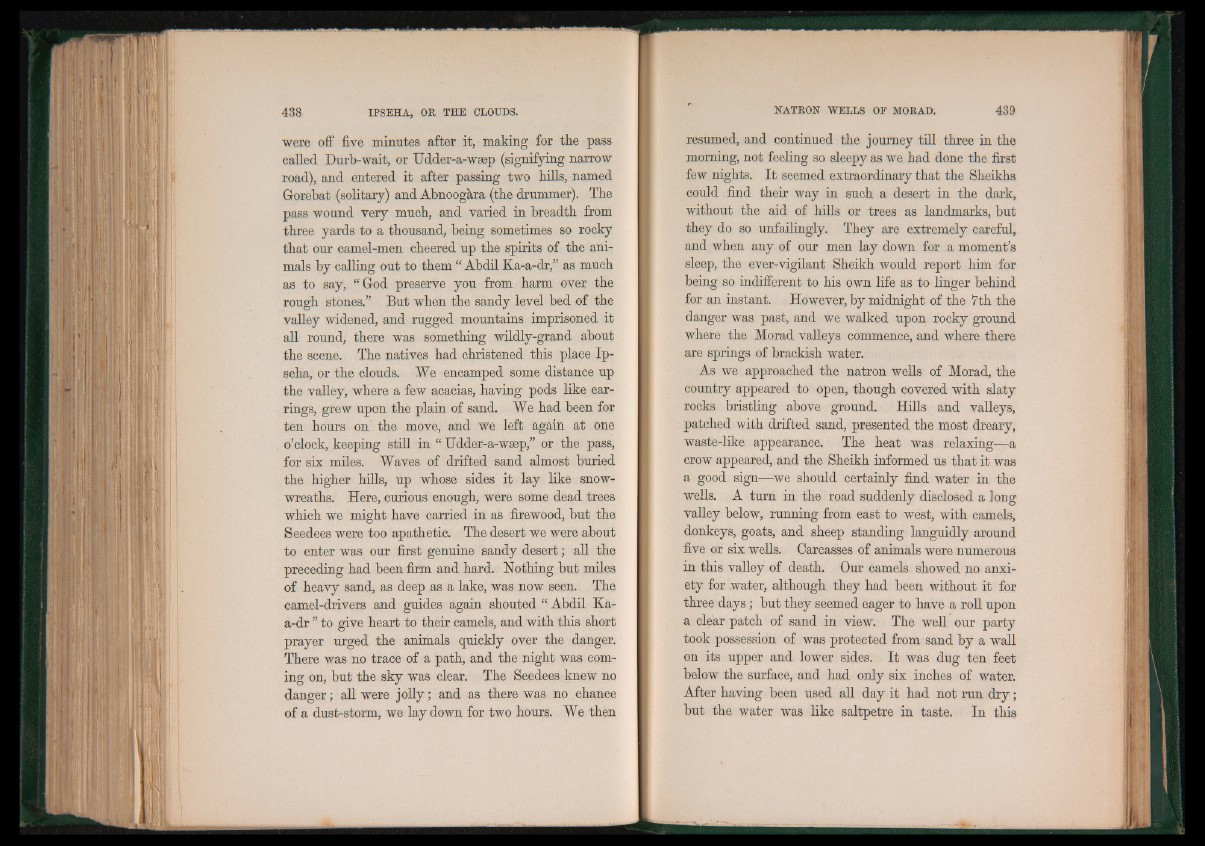
were off five minutes after it, making for the pass
called Durb-wait, or Udder-a-wsep (signifying narrow
road), and entered it after passing two hills, named
Gorebat (solitary) and Abnoogkra (the drummer). The
pass wound very much, and varied in breadth from
three yards to a thousand, being sometimes so rocky
that our camel-men cheered up the spirits of the animals
by calling out to them “ Abdil Ka-a-dr,” as much
as to say, “ God preserve you from harm over the
rough stones.” But when the sandy level bed of the
valley widened, and rugged mountains imprisoned it
all round, there was something wildly-grand about
the scene. The natives had christened this place Ip-
seha, or the clouds. We encamped some distance up
the valley, where a few acacias, having pods like earrings,
grew upon the plain of sand. We had been for
ten hours on the move, and we left again at one
o’clock, keeping still in “ Udder-a-wsep,” or the pass,
for six miles. Waves of drifted sand almost buried
the higher hills, up whose sides it lay like snow-
wreaths. Here, curious enough, were some dead trees
which we •might have carried in as firewood, but the
Seedees were too apathetic. The desert we were about
to enter was our first genuine sandy desert; all the
preceding had been firm and hard. Nothing but miles
of heavy sand, as deep as a lake, was now seen. The
cam el-drivers and guides again shouted “ Abdil Ka-
a-dr ” to give heart to their camels, and with this short
prayer urged the animals quickly over the danger.
There was no trace of a path, and the night was coming
on, but the sky was clear. The Seedees knew no
danger; all were jolly; and as there was no chance
of a dust-storm, we lay down for two hours. We then
resumed, and continued the journey till three in the
morning, not feeling so sleepy as we had done the first
few nights. It seemed extraordinary that the Sheikhs
could find their way in such a desert in the dark,
without the aid of hills or trees as landmarks, but
they do so unfailingly. They are extremely careful,
and when any of our men lay down for a moment’s
sleep, the ever-vigilant Sheikh would report him for
being so indifferent to his own life as to linger behind
for an instant. However, by midnight of the 7th the
danger was past, and we walked upon rocky ground
where the Morad valleys commence, and where there
are springs of brackish water.
As we approached the natron wells of Morad, the
country appeared to open, though covered with slaty
rocks bristling above ground. Hills and valleys,
patched with drifted sand, presented the most dreary,
waste-like appearance. The heat was relaxing—a
crow appeared, and the Sheikh informed us that it was
a good sign—we should certainly find water in the
wells. A turn in the road suddenly disclosed a long
valley below, running from east to west, with camels,
donkeys, goats, and sheep standing languidly around
five or six wells. Carcasses of animals were numerous
in this valley of death. Our camels showed no anxiety
for water, although they had been without it for
three days; but they seemed eager to have a roll upon
a clear patch of sand in view. The well our party
took possession of was protected from sand by a wall
on its upper and lower sides. It was dug ten feet
below the surface, and had only six inches of water.
After having been used all day it had not run d ry ;
but the water was like saltpetre in taste. In this